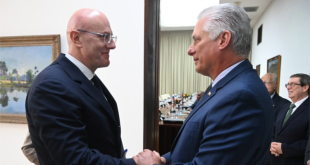The threat of President Trump to impose tariffs on the countries that buy oil from Venezuela is another example of how their commercial measures could affect China more strongly, even when it is not mentioned as a goal.
Trump announced last week the «secondary tariffs» of 25%, presenting them as directed against the authoritarian government of Nicolás Maduro in Venezuela and against the band of the Train of Aragua. Tariffs related to Venezuela could still be imposed in addition to the high tariffs Trump declared on Wednesday, that they raise their new tariffs on 54%Chinese products.
The largest oil buyer in Venezuela is China, and China is the country with the lowest capacity to stop buying oil from Venezuela.
Venezuela owes around 10 billion to Chinese state banks, according to Aiddata, a research institute at William and Mary by Williamsburg, Virginia, which collects information on Chinese financing for development.
Chinese banks need their loans to be paid to Venezuela. They already face strong real estate loans in their country. On Monday, China’s Ministry of Finance announced the sale of bonds for an approximate value of 70,000 million dollars to prop up the four largest commercial banks in the country.
However, after more than a decade of bad economic management, Venezuela practically does not have legal exports, except oil, to raise the necessary funds to continue paying their debts with China.
The Venezuelan crude is highly contaminated with sulfur. Chinese state energy giants are among the few companies that have invested in refineries capable of processing oil with high sulfur content.
Venezuela is one of Beijing’s closest diplomatic allies, which makes it even more difficult than China stop buying its oil. Last summer, when Maduro won a new presidential mandate, he received a congratulation note from Xi Jinping, the top leader of China.
A spokesman for the Chinese Ministry of Foreign Affairs, Guo Jiakun, criticized last week the expected US tariffs. «The United States has been abused for a long time of illegal unilateral sanctions and the ‘long arm jurisdiction’, and has seriously interfered with the internal affairs of other countries,» he said.
It was not clear when tariffs could come into force. Last week, Trump announced that they would take effect on April 2. However, according to the Trump administration, the Secretary of State, Marco Rubio, must still determine if the countries have bought Venezuelan oil before tariffs enter into force.
China bought an average of 268,000 barrels of daily oil last year to Venezuela, a country that exported a total of 662,000 barrels per day, according to Kpler, a company specialized in the follow -up of oil shipments. The United States bought 234,000 barrels per day, which makes it the second largest buyer after China. On the other hand, Trump is gradually eliminating US purchases during the next two months.
China represents 62% of Venezuela’s exports to other countries, and India and Spain also buy considerable amounts. The volume of Venezuelan crude oil that reaches any of those countries has decreased in the last two weeks, according to Kpler, in what could be a caution signal there to face additional US tariffs.
https://dolartoday.com/wp-content/uploads/2025/04/refinerias.jpg
#York #Times #Trumps #threat #impose #tariffs #Venezuelan #oil #buyers #press #China
Source link
 Latest Breaking News Online News Portal
Latest Breaking News Online News Portal



